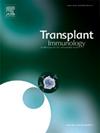神话或现实:自体造血细胞移植后的移植物抗宿主病,一个多中心的经验。
IF 1.4
4区 医学
Q4 IMMUNOLOGY
引用次数: 0
摘要
急性移植物抗宿主病(aGvHD)是一种罕见但临床上重要的自体造血细胞移植并发症。本回顾性多中心研究的目的是评估19例自体移植物抗宿主病(auto-GvHD)患者的临床特征、结局和相关危险因素。该队列包括12例多发性骨髓瘤和7例淋巴瘤患者,中位年龄为58 岁。所有患者均发展为aGvHD,主要累及胃肠道、皮肤或肝脏,多数累及孤立器官。调理方案通常包括美法仑,所有患者均行外周血造血细胞移植。在大多数病例中,使用局部皮质类固醇和全身甲基强的松龙进行一线治疗是有效的,而使用环孢素和鲁索利替尼成功治疗了类固醇抵抗性GvHD。多发性骨髓瘤患者来那度胺维持治疗未导致GvHD复发。未观察到与gvhd相关的死亡率,所有治疗病例均达到完全缓解。这些发现强调了早期发现和及时治疗自身gvhd的重要性,特别是在高危人群中,并强调了进一步研究阐明其病理生理和优化管理策略的必要性。本文章由计算机程序翻译,如有差异,请以英文原文为准。
Myth or reality: Graft versus host disease after autologous hematopoietic cell transplantation, a multicentre experience
Acute graft-versus-host disease (aGvHD) is a rare but clinically significant complication of autologous hematopoietic cell transplantation. The aim of this retrospective multicenter study was to evaluate the clinical features, outcomes and risk factors associated with autologous graft-versus-host disease (auto-GvHD) in 19 patients. The cohort included 12 multiple myeloma and 7 lymphoma patients with a median age of 58 years. All patients developed aGvHD, predominantly involving the gastrointestinal tract, skin or liver, with isolated organ involvement in the majority. Conditioning regimens commonly included melphalan and all patients underwent peripheral blood hematopoietic cell transplantation. First-line treatment with topical corticosteroids and systemic methylprednisolone was effective in most cases, while steroid-resistant GvHD was successfully treated with cyclosporine and ruxolitinib. Lenalidomide maintenance therapy in multiple myeloma patients did not lead to GvHD recurrence. No GvHD-related mortality was observed and complete responses were achieved in all treated cases. These findings underscore the importance of early detection and prompt treatment of auto-GvHD, particularly in high-risk populations and highlight the need for further research to elucidate its pathophysiology and optimise management strategies.
求助全文
通过发布文献求助,成功后即可免费获取论文全文。
去求助
来源期刊

Transplant immunology
医学-免疫学
CiteScore
2.10
自引率
13.30%
发文量
198
审稿时长
48 days
期刊介绍:
Transplant Immunology will publish up-to-date information on all aspects of the broad field it encompasses. The journal will be directed at (basic) scientists, tissue typers, transplant physicians and surgeons, and research and data on all immunological aspects of organ-, tissue- and (haematopoietic) stem cell transplantation are of potential interest to the readers of Transplant Immunology. Original papers, Review articles and Hypotheses will be considered for publication and submitted manuscripts will be rapidly peer-reviewed and published. They will be judged on the basis of scientific merit, originality, timeliness and quality.
 求助内容:
求助内容: 应助结果提醒方式:
应助结果提醒方式:


